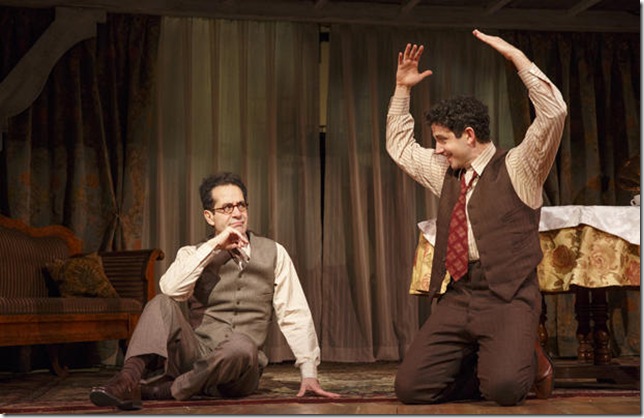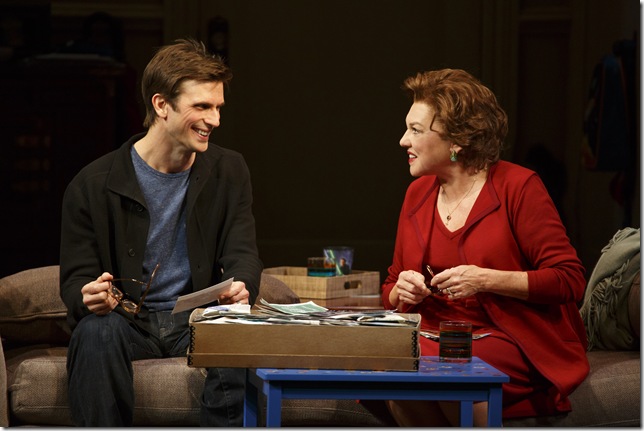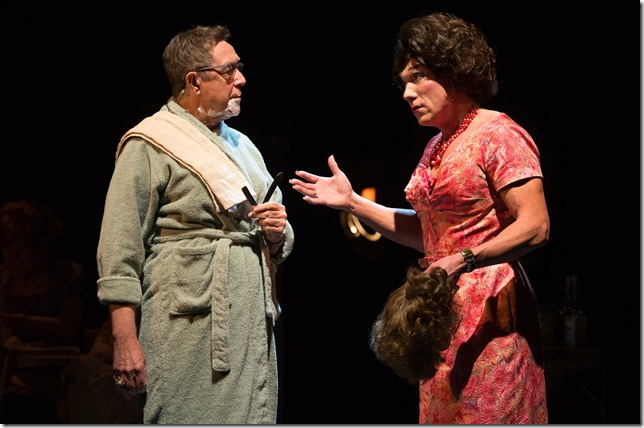For the runup to the Tony Awards on Sunday, ArtsPaper’s Hap Erstein takes a series of looks at the shows up for Broadway’s highest honors:
Act One — Just as marijuana is thought of as a gateway drug to harder stuff, Moss Hart’s autobiography Act One is surely responsible for getting many a young would-be theater artist hooked on the stage.
The memoir of an impoverished kid from the Bronx and how his passion for the theater led to a legendary career as a playwright and director is such a favorite of actors and audience members that they probably approached James Lapine’s adaptation — as I did — with a combination of anticipation and apprehension.
Both are appropriate. The first act is a sublime valentine to the theater that captures Hart’s wide-eyed recollections with affection. The second act, however, zeroes in on Hart’s Broadway debut — his initial collaboration with the brilliant, but eccentric George S. Kaufman, Once in a Lifetime — and it soon bogs down in the minutiae of fixing the script.
The irony is that in its out-of-town tryout, Once in a Lifetime had second-act problems. And in relating them, Act One comes down with the same malady. It is not enough to sink the play, or the gorgeous, well-acted production that Lapine also directs, but what begins as a great theatergoing experience gets downgraded to merely very good.
Lapine’s efforts to boil the sprawling source material down to two-and-a-half hours on a massive, frequently revolving stage (by designer Beowulf Borritt) are impressive, but his most inspired decision was casting Tony Shalhoub. In fact, he plays three roles — Hart’s father, Hart at middle age and, especially, frizzy-haired, germ-phobic Kaufman, who is surely a cousin to detective Adrian Monk, but with a wholly different set of personal quirks.
Nearly all of the sizeable cast takes on multiple roles, including the wondrous Andrea Martin as Moss’s nurturing Aunt Kate, who introduces him to the theater, as his agent Freida Fishbein and as Kaufman’s placating wife, Beatrice. The only exception is Santino Fontana (late of Cinderella), who holds the production together as wide-eyed Moss Hart.
Act One probably appeals most to those with a personal connection to the theater, but it also works as a metaphor for anyone who pursues his dream. Surely regional theaters with deep pockets will produce this appealing script, but any subsequent productions are unlikely to equal the current one at the Lincoln Center.
ACT ONE, Vivian Beaumont Theatre, 150 W. 65th St., New York. Through Sunday, June 15. $77-$137. (212) 239-6200.
* * *
Mothers and Sons — The AIDS crisis is still with us, but, for better or worse, it feels like there is less urgency to the situation. Plays from the early days of the epidemic have returned in muted form, like the less angry television movie of The Normal Heart and Terrence McNally’s Mothers and Sons, a revised and expanded version of Andre’s Mother, a teleplay from 1990.
What originally took place at a graveside, as a grieving mother confronted her dead gay son’s surviving partner, now is set in the former lover’s New York apartment. And reflecting the advances in the gay community in the intervening quarter century, changes that homophobic Katharine Gerard cannot fully comprehend, Cal Porter has since married his new partner, Will Ogden, and the two of them are raising a son.
Through his long, distinguished career in the theater, McNally has had an unwavering agenda of promoting greater understanding between the gay and straight worlds. So when we first see Tyne Daly as Katharine, clad in a mink coat that serves as her suit of armor for what looks to be a brewing battle, the chances are pretty good that 90 minutes later both she and Cal will have new insights on each other’s sense of loss.
Cal (Frederick Weller) had been doing a pretty good job of moving on from the life he had with Andre, forging a family with the somewhat younger Will (Bobby Steggart) and their adopted, adorable son Bud (Grayson Taylor). The last thing he wanted was a belligerent encounter with Katharine. Their only previous meeting was at Andre’s funeral and of course she resents the life Cal has now.
So Katharine arrives from Texas at Cal’s affluent apartment, unsure of why exactly she is there, perhaps looking for a scapegoat for her son’s death, or perhaps seeking a way to lessen the rage that still consumes her. She is convinced that New York made her son gay, while Cal becomes exposed to the gorgon that Andre had described to him so often in the past.
Daly gives a remarkable performance that is all hard edges. Her Katharine is an alien from a earlier era and a different place, who sees no reason why she should change her views, even if so much of the country has evolved and accepted. She and Cal clash, as she goads him and he finds himself drawn into debate over their opposite perceptions, despite his efforts to avoid confrontation. All he really wants is for her to leave.
Despite the tensions of the situation, McNally finds ways to inject humor into the play. But do not be surprised if you find your face is moist at the end of the draining experience of Mothers and Sons.
The play has been described as manipulative, and that would be hard to deny. Still, it captures a moment in time, in the shadow of the AIDS crisis and the dawning of a new era of gay rights that McNally knows and captures expertly. Ultimately Mothers and Sons is less of a time capsule and more about a gulf between people that takes a few steps towards being bridged.
MOTHERS AND SONS, Golden Theatre, 252 W. 45th St., New York. (212) 239-6200.
* * *
Casa Valentina — Over 30 years ago, Harvey Fierstein staked his claim on Broadway with an epic play about a gay drag queen, Torch Song Trilogy, picking up two Tony Awards in the process. Since then, he has spent much of his time with the often thankless, but lucrative job of writing the book for such musicals as La Cage aux Folles and, just last season, Kinky Boots. With them, he brought to mainstream entertainment his enduring theme of what it means to be a man.
Fierstein now returns to playwriting with Casa Valentina, a look back to the early 1960s, to a real-life Catskills resort where straight men took refuge from the outside world, indulging their primal urge to dress up as women. Although he begins with plenty of humor, Fierstein has serious matters in mind here, asking us to walk a mile in these guys’ high heels, to feel the pain of their struggle and — shades of Boys in the Band — their self-loathing.
The year is 1962, the locale is a run-down bungalow colony based on the actual Chevalier d’Eon, or at least its fictional cousin. There we meet similarly fictional characters whose interest in cross-dressing varies from gender identity to a sexual impulse to a preference for female fashions. But the unenlightened times being what they are, they all need a shelter away from the public eye to indulge these aims.
Running the Casa is George (Patrick Page), whose alter ego is Valentina, and his extremely supportive wife, Rita (Mare Winningham). Like the soon-to-be suspects in an Agatha Christie mystery, the weekend guests at George’s inn arrive one by one, allowing us to quickly meet them and their individual quirks and tics.
Prominent among them is Jonathon, a/k/a Miranda (Gabriel Ebert, Tony winner for last season’s Matilda), a newcomer who has warily left his bride in the lurch to give in to his female side. Then there is Bessie (Tom McGowan), a portly Army veteran who knows his way around an Oscar Wilde bon mot, a young smart-mouthed troublemaker named Gloria (Nick Westrate) and older, more set in their ways Terry (John Cullum) and Charlotte (Reed Birney). Perhaps the most paranoid — or at least the one with the most to lose if exposed — is Amy (Larry Pine), a noted judge.
They don their finery and get acquainted or reacquainted, before Casa Valentina gets down to business. You see, the hotel is having money troubles, there are rumors of federal agents cracking down on gay pornography and probably not bothering to make the distinction between gay and straight men in dresses. As Charlotte argues, the best defense is to “come out” as heterosexual cross-dressers, a proposal that ignites intense dissension.
Orchestrating this high-testosterone ensemble is director Joe Mantello, who pulls fine performances from his cast members, each firmly committed to the array of discomfort of these characters with period-perfect authenticity. Completing the picture is the faux-softness of Rita Ryack’s wardrobe for these men addicted to dress-up.
Audiences are bound to be drawn into this saga of social woe from our not-too-distant past. And for that matter — take note, Harvey — Casa Valentina would be rich source material for a musical version of this tale.
CASA VALENTINA, Samuel Friedman Theatre, 261 W. 47th St., New York, through Sun, June 29. $67-$125. (212) 239-6200.


